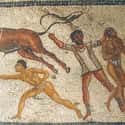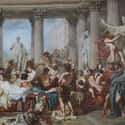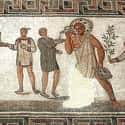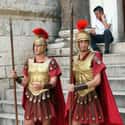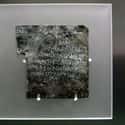-
(#3) They Washed Their Clothes With Urine
Here's the ancient version of a dry cleaner: a fuller, who used urine to clean clothes. It sounds disgusting, but ammonia, a key ingredient in human-made water, is great at getting tricky stains out of togas. And, unlike soap, it was easy to acquire. Fullers could just put vessels on street corners, and men who needed to pass water could contribute their services by using into the buckets.
The first-century Roman emperor Vespasian famously instated a "urine tax," raking in a bunch of cash by taxing the public bins where people dumped urine collected from toilets. And the tax was quite lucrative. Some even credit it with saving the Empire at a particularly precarious time. When Vespasian's son, the future emperor Titus, expressed his displeasure at this governmental initiative, his dad "held a piece of money from the first payment to his son's nose, asking whether its odor was offensive to him," according to Suetonius. Titus, of course, said no, and Vespasian famously replied, "Yet it comes from urine!"
-
(#13) Thousands Of Animals And Gladiators Perished In Games
Men didn't just fight one another in the gladiatorial games; they also fought wild beasts that were imported from all over the empire. With no PETA around to defend them, these exotic animals were caged in dismal conditions and then unleashed to ravage their human rivals. In Emperor Trajan's games held between 108-109 C.E. alone, 10,000 gladiators and 11,000 animals were slaughtered (although some think chroniclers' numbers were exaggerated). In another festive celebration, 8,000 animals were slain in 80 C.E. to christen Titus's new amphitheater.
-
(#16) Dinner Parties Took Place In Piles Of Shells And Animal Bones
While the existence of "vomitoriums" where Romans would intentionally purge themselves is a merely a myth, dinner parties were still pretty gross by modern standards. At elite parties, guests would eat while reclining on sofas, where they'd just toss animal bones, skins, seafood shells, olive pits, and any other refuse on the ground for slaves to clean up.
-
(#4) The Empire Was Built By Millions Of Slaves
Rome wasn't built in a day, but it was built on the backs – and with the hands of – a magnitude of slaves. In fact, one of the city's foundational myths is the story of the capture of the Sabine women, who were taken from their community and forced to become reproductive machines for the creation and continuance of the Roman population.
Whether bought in markets, seized from nearby communities, or captured as a result of foreign wars, servi (as the slaves were called in Latin) were estimated to have made up anywhere from one-third to three-fifths of Italy's entire population. That means there were up to four million slaves in Italy alone, which doesn't even count the rest of the Empire!
-
(#12) Roman Soldiers And Emperors Slayed In Bulk
The Roman army, during both the Republican and Imperial periods, decimated opposing armies and Average Joes alike, removing whoever got in the way of areas they were looking to conquer. And the Romans eliminated in bulk.
Statistics vary depending on the account, but the second-century sack of Seleucia, a Mesopotamian city, involved "burning down" a community of 300,000. Later, the emperor Maxentius exterminated thousands of his fellow senators in order to take their property and wives, and some estimate that the emperor Tiberius slaying more than 35,000 during his reign.
-
(#11) They Removed Their Rivals Using Deplorable Methods
Romans loved to off their competitors, using whatever means necessary to get the job done. Augustus's stepson, the general Germanicus, was allegedly "cursed" (the malediction was written down on a lead tablet and entombed in his house). Lead tablets pierced with nails were a preferred method of cursing since this tactic was thought to bring about the desired effect in the form of a legal agreement with the gods to do harm to a person.
Toxic plants and tainted food was another common means of removing someone you didn't like in imperial Rome. A whole host of emperors were allegedly guilty of offing people they hated, including their own relatives and rivals to their throne.
New Random Displays Display All By Ranking
About This Tool
In the era of extremely poor health and medical conditions, the disgusting life of the ancient Romans may be beyond your imagination. In ancient Rome, urine was a big business, and the government even set a special tax on urine sales. There were people who make a living by selling urine. Some of them go to public toilets to collect urine, while others collect urine from house to house. You must not guess what they did with urine. Ancient Romans washed clothes with urine.
It is certain that urine was not the most disgusting daily life in ancient Rome. The random tool shares 16 gross details of daily life in ancient Rome that will shock you.
Our data comes from Ranker, If you want to participate in the ranking of items displayed on this page, please click here.












